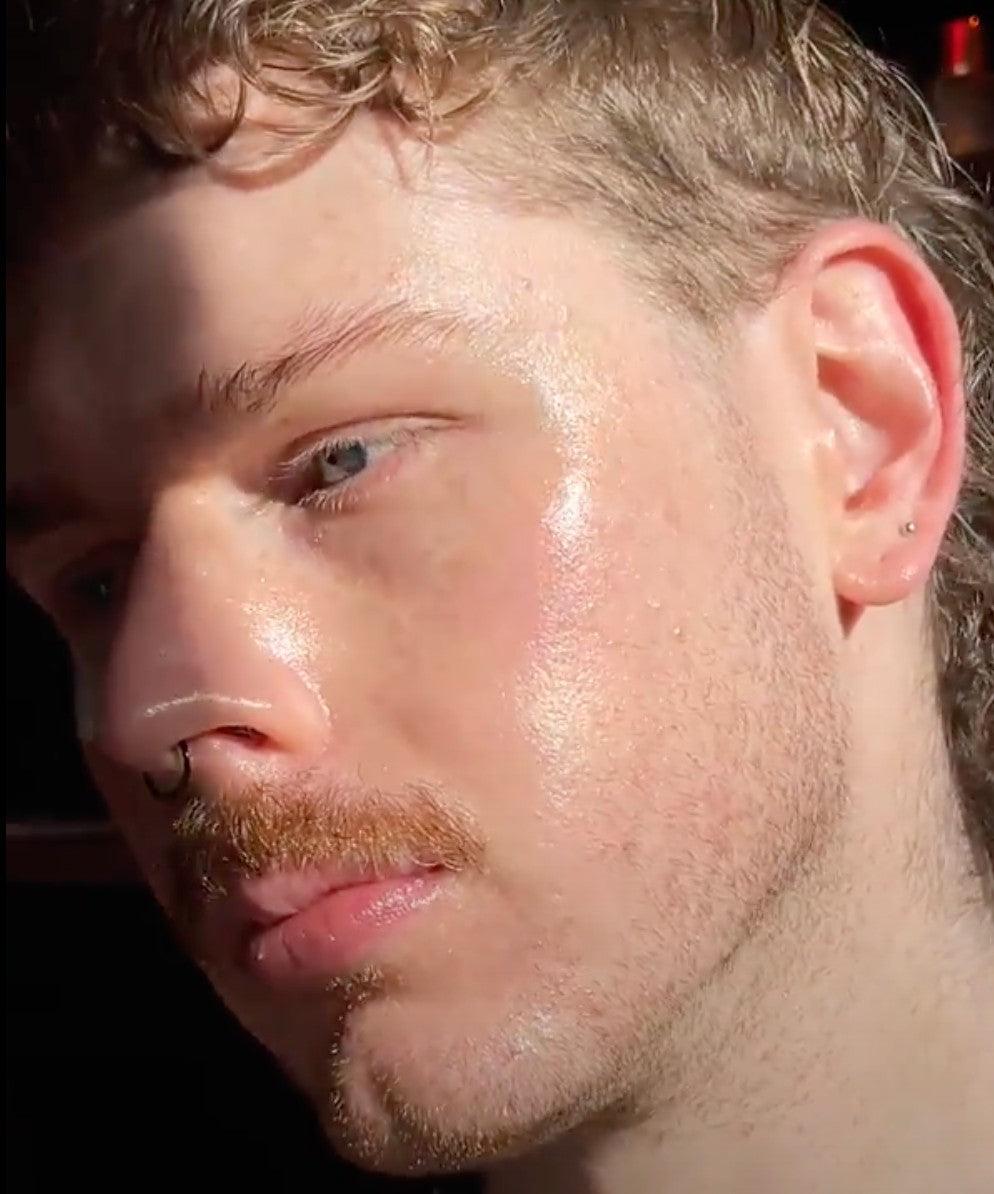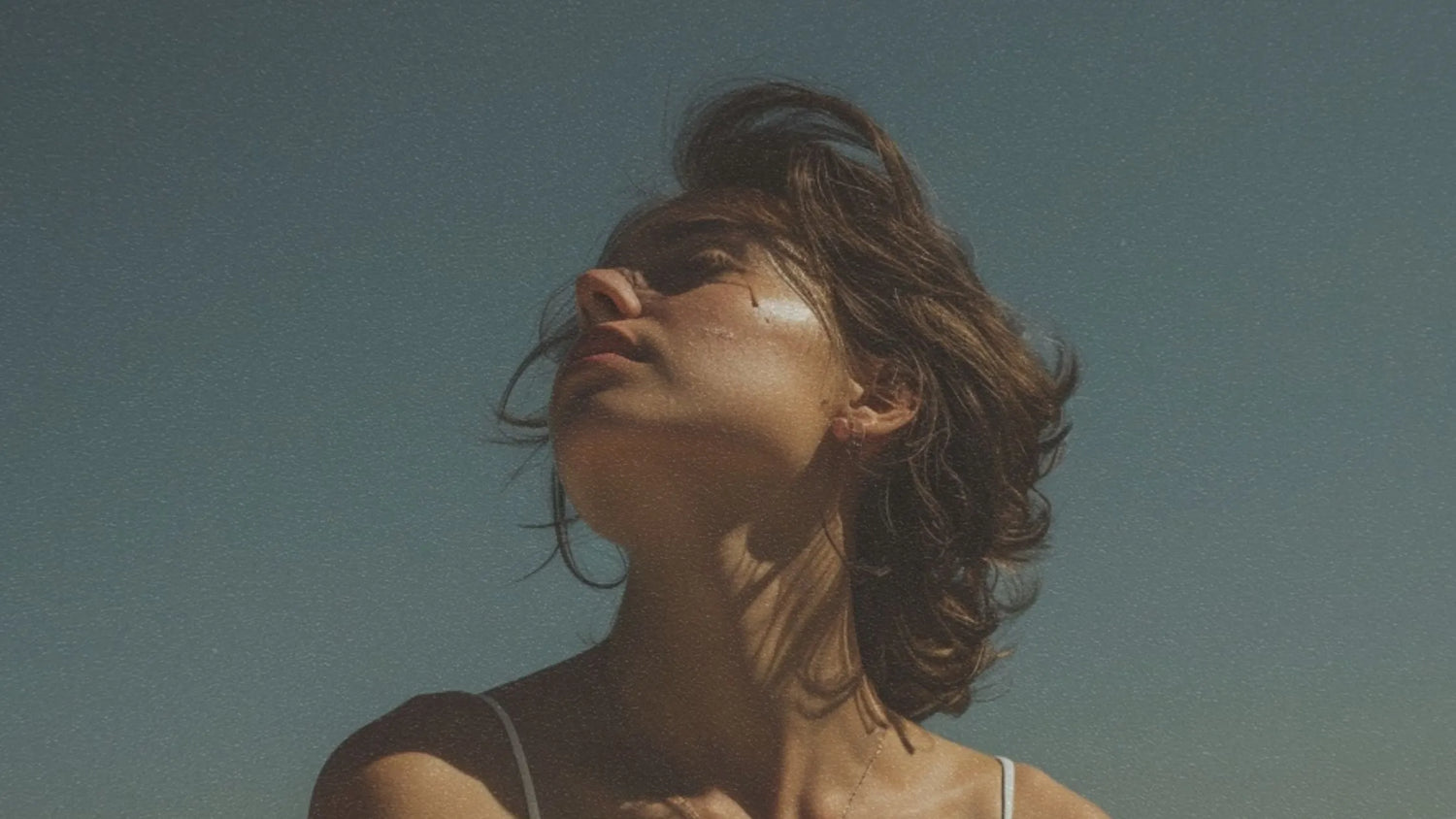Who is Iain Jefferey really...a little bio?
Iain Jeffery is someone full of passion, complexity, and pride. I am a 28-year-old, non-binary person who is actively trying to relearn a lot. I am passionate about social justice and equality, poetry, food, beauty, art, and live music. I live in The Hills to the East of Melbourne, with my partner and my dog. In my free time you can normally find me in the kitchen, at a gig, getting tattooed or enjoying a pint at the pub. I believe that life is all about being hedonistic without being greedy, and that it’s wise to keep an eye on the kind of energy you radiate to the universe because it has a wonderful ability to keep you in check. My goal in life is to just leave the world a little bit… nicer than I found it.
What was your childhood like?
It was complicated, and very scattered. I’m an only child and I spent my early childhood on the Sunshine Coast in Queensland, before relocating at four or five to the small town of Dalby, which is about 3 hours west of Brisbane. My parents got divorced when I was nine, so I moved to Brisbane with my mum before moving down to Melbourne to live with my dad at aged 11. Originally, I lived in the Western Suburbs, before moving to the Southeast suburbs at 15.
I moved around a lot and went to a total of two primary schools and two high schools and had ‘mum’s house’ and ‘dad’s house’. It was easy for me to feel like I was never anywhere long enough to place roots. I joke that I was raised on the internet, but I really think I belonged to the first generation of the Internet Latchkey Kids. I would come home to an empty house and spend hours by myself on the internet. It was the only place that I ever found anyone could even approach understanding me, so it’s a space that I’ve at times felt far too comfortable in. This was the late 2000s and early 2010s, too, a time where the internet was a completely lawless land. I’m often envious of those who had nice, consistent childhoods, but at least mine gave me some grit.
Could you share your journey of self-discovery and acceptance into your sexuality and identity, and how it has influenced your perspective on life and relationships? Any advice for others?
Oh, what a journey it’s been. I remember realising my sexuality at a very young, and very vivid moment. The year would’ve been 2008 and I was attending the all-boys, Christian Brother’s run, St Joseph’s College in Pascoe Vale, Melbourne. I was already new to Melbourne; did not have a Greek or Italian heritage and I didn’t understand the AFL ladder, so I already stood out like a sore thumb. I remember walking past the statue of St Joseph himself in the tiny schoolyard, and it kind of just… hit me. I liked boys. I was weirdly calm about it, but knew it was something that I would have to keep secret.
I say that I officially ‘came out’ in 2010 at the ripe age of 14 and on the precipice of 15. I had just moved to a new, co-education (and for the first time in my life, government owned) school. I felt the time was right to finally reveal my deep, dark secret. The first girl I ended up telling told everyone. At the time, I was mad at her; in retrospect she saved me a lot of emotional labour. People my age were mostly okay with it, but homophobic bullying was something I knew intimately so I was not shocked by the kickback I received. I think the thing that people forget about the 2010s is that it was a decade of immense change. Particularly the LGB end of the LGBTIQ+ community. Same-sex marriage was starting to become more common-place, but homophobia was rife. The internet was viscous, I was regularly called slurs on the street, I was abused by the police, and I was very much a target every time I walked down the street.
I didn’t start to explore my gender identity until the pandemic. Survival had really been my goal up until that point, and being able to spend so much time in the sanctuary of my home gave me a chance to, finally, realise who I truly was. As a teenager, I consumed as much queer media as I could, but it was limited, often coded and hard to find. The only queer representation I saw that I related to was gay men. I didn’t have the words or the understanding to express gender dysphoria, and representation of gender diverse, non-binary and trans people was non-existent. I try to create the representation today that I wish I had then.
My advice for others who are finding themselves questioning gender, sexuality or both is to give yourself space and patience. I think as humans we instinctively seek out labels or descriptions that we feel like fit us perfectly because if we can define, then we can explain. Unfortunately, the human experience is far more nuanced than that. Your identity is valid because it’s yours, even if you can’t quite describe it. Give it time, you’ll figure it out.
I stalked you on LinkedIn, you have a degree in Criminology...how did this come about and why did you choose another path?
I do! I hold a Bachelor of Arts with a double major in Criminology and Sociology, and an honours degree in Criminology from Monash University. The high school I graduated from often ranks very highly in ATAR scores and is often in the top 20 schools in Victoria. There was an expectation that university was just something you did, and if you didn’t want to let your school down, you went to Monash or Melbourne.
I wanted to study Law but didn’t have the grades, so I thought I would do a year of Arts and then transfer. I loved Criminology and Sociology though. For the first time in my life, people were explaining the world to me. I was exposed to gender theory, I saw the inequalities of the world, and I met people who tried to understand and explain the why. I got just over 3 years into a PhD in Criminology too, before I quit. An unfortunate victim of the COVID era.
My education is one of the gifts in this lifetime that I most thankful for. But academia is exhausting. I think my decision to pursue beauty was really influenced by the fact that it’s an area that I feel like I really understand. I’m sure at some stage I’ll go back and finish a PhD… Eventually.
Plus, at the end of the day, if you can understand what drives people to crime, you can understand what drives people to beauty. Human behaviour is all very connected in very odd ways.
Tell us about your relationship with social media? Obviously, it's part of your work, but how do your interactions on social media effect your life.
It’s another mixed one. I don’t think you’ll ever meet a creator who doesn’t have a love/hate relationship with social media.
I love that it gives me a platform to showcase myself. As a grow, understand myself more and unpack what I want to leave as a legacy, I love that I can talk about everything from serums to gender experience.
It can become very consuming, though. You are constantly bombarded with people who are more “successful” than you. It’s tough to remember that social media is someone’s highlight reel, but only they really know what happens in the editing room. I also find myself approaching lots of experiences with the perspective that content is the most important thing, and not… enjoying the moment.
I find the trick for me is to keep things sacred and personal. You can be open, authentic, and honest without showing every secret you’ve ever had. In fact, keeping some things for you stops you going completely off the deep end.
In your opinion, what role does beauty play in self-expression and identity?
To me, it’s everything. Beauty is the main way that I fuck with gender. In my mind, I am still a small child who is picked on because they’re different. Beauty gives me the ability to put on a mask that shows the world who I really am.
I feel powerful when I’m wearing platform Dr Martens that make me six foot three, and a black smoky eye. It’s the way I show the world my queer power, and it’s the way I put up my defences when I walk down the street. Learning to be non-conforming in the way I present myself to the world and being so proud about it is the best thing I’ve ever done. None of it would’ve been possible without beauty. People laugh when I tell them eyeliner or red lipstick has magical powers, but they do. Expressing yourself authentically makes you feel completely untouchable.
How do you envision a future beauty industry that promotes self-love, acceptance, and embraces individuality? What steps do you believe we can take collectively to make that vision a reality?
This is a tough question, I think that in a way, we will never achieve this until we learn to unlearn very systemic beauty standards. I think to do that, we have a lot of dismantling of larger structures to go.
In the short term, I suppose I hope the world will collectively embrace that beauty is incredibly diverse. Just because the model in an ad doesn’t look like you, it doesn’t mean your beauty or identity isn’t important. We are stronger when we support and uplift each other. The more we diversify the beauty standard, the more we all can feel our authentic individuality.
What was the last book that you read?
I’m a terrible reader and am actively trying to get better, but I haven’t finished a book recently. Instead, I’d like to tell you about the book that changed my life. Holding the Man by Timothy Conigrave is a book I often feel fate brought to me. I was 13, recently aware of my own sexuality when I found it on a bookshelf in a bookstore. It’s the poignant, touching and at times incredibly sad memoir of Timothy Conigrave and his boyfriend John Caleo. They attended all boys catholic school in Melbourne together in the 1970s.
When I found it, the beginning of the book felt a lot like my own life. It gave me hope and while not an easy read, per se, it is the most honest and beautiful story of love, pain, and sorrow. I re-read it every couple of years, but I do not think I would’ve become the person I am today had I not read it.




